University Management: Community Engagement Report Analysis
VerifiedAdded on 2022/12/08
|11
|2758
|264
Report
AI Summary
This report delves into the concept of social innovation and community engagement, analyzing its application in fostering greater community involvement. It examines community engagement theory, including key factors such as building connections, acting with humility, and pursuing justice. The report outlines various community engagement approaches, including advocacy, community-based research, and project-based initiatives. A proposed social innovation is presented, focusing on addressing underemployment and environmental degradation through a textile service. The report also discusses financial, environmental, and ethical implications, highlighting the skills and challenges faced by community workers and volunteers. Finally, it emphasizes the benefits of personal and professional development and employability resulting from community engagement, concluding that social innovation and community engagement play a vital role in addressing community issues. The report is a valuable resource for students seeking to understand and apply management principles in a community-focused context.

Running head: MANAGEMENT
Management
Name of the Student
Name of the University
Author Note
Management
Name of the Student
Name of the University
Author Note
Paraphrase This Document
Need a fresh take? Get an instant paraphrase of this document with our AI Paraphraser
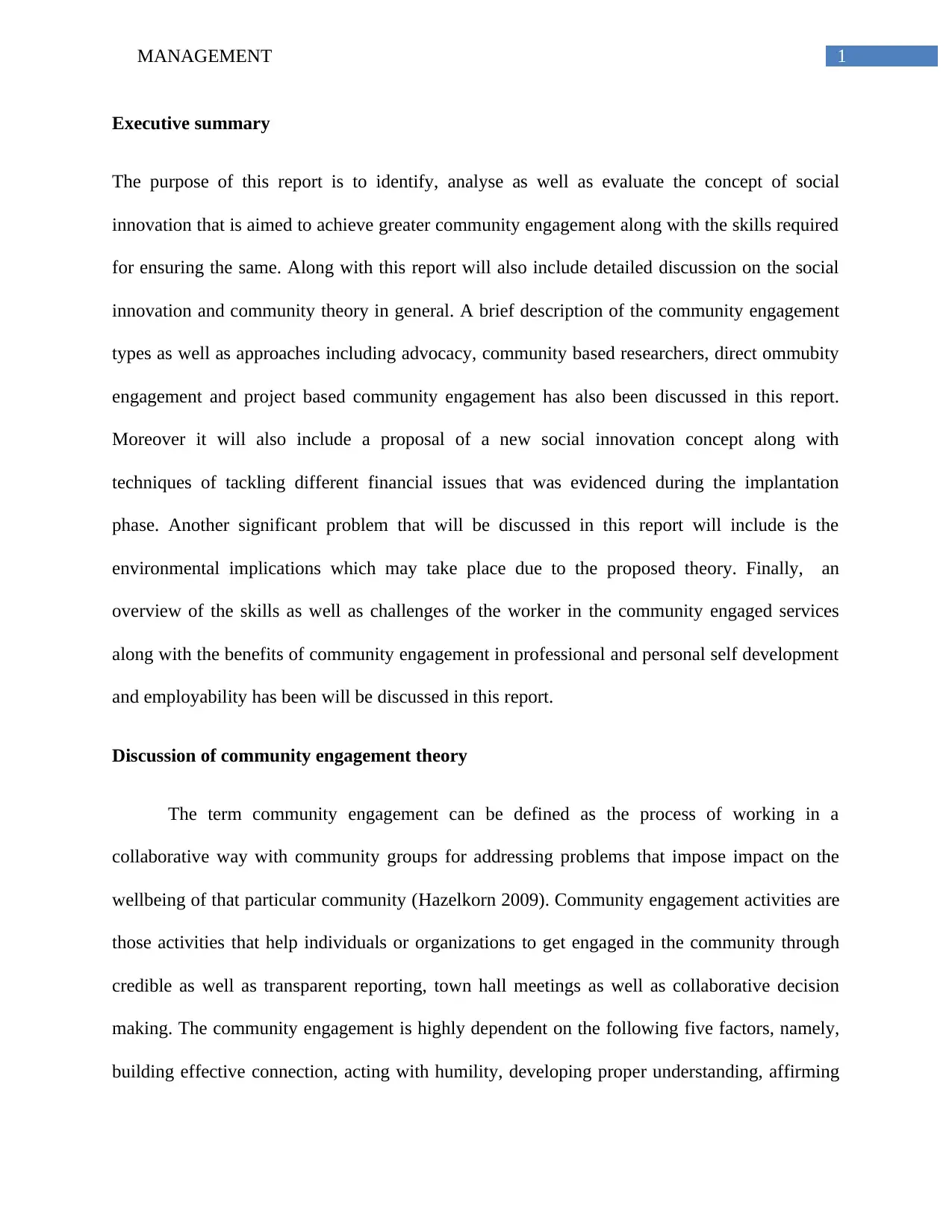
1MANAGEMENT
Executive summary
The purpose of this report is to identify, analyse as well as evaluate the concept of social
innovation that is aimed to achieve greater community engagement along with the skills required
for ensuring the same. Along with this report will also include detailed discussion on the social
innovation and community theory in general. A brief description of the community engagement
types as well as approaches including advocacy, community based researchers, direct ommubity
engagement and project based community engagement has also been discussed in this report.
Moreover it will also include a proposal of a new social innovation concept along with
techniques of tackling different financial issues that was evidenced during the implantation
phase. Another significant problem that will be discussed in this report will include is the
environmental implications which may take place due to the proposed theory. Finally, an
overview of the skills as well as challenges of the worker in the community engaged services
along with the benefits of community engagement in professional and personal self development
and employability has been will be discussed in this report.
Discussion of community engagement theory
The term community engagement can be defined as the process of working in a
collaborative way with community groups for addressing problems that impose impact on the
wellbeing of that particular community (Hazelkorn 2009). Community engagement activities are
those activities that help individuals or organizations to get engaged in the community through
credible as well as transparent reporting, town hall meetings as well as collaborative decision
making. The community engagement is highly dependent on the following five factors, namely,
building effective connection, acting with humility, developing proper understanding, affirming
Executive summary
The purpose of this report is to identify, analyse as well as evaluate the concept of social
innovation that is aimed to achieve greater community engagement along with the skills required
for ensuring the same. Along with this report will also include detailed discussion on the social
innovation and community theory in general. A brief description of the community engagement
types as well as approaches including advocacy, community based researchers, direct ommubity
engagement and project based community engagement has also been discussed in this report.
Moreover it will also include a proposal of a new social innovation concept along with
techniques of tackling different financial issues that was evidenced during the implantation
phase. Another significant problem that will be discussed in this report will include is the
environmental implications which may take place due to the proposed theory. Finally, an
overview of the skills as well as challenges of the worker in the community engaged services
along with the benefits of community engagement in professional and personal self development
and employability has been will be discussed in this report.
Discussion of community engagement theory
The term community engagement can be defined as the process of working in a
collaborative way with community groups for addressing problems that impose impact on the
wellbeing of that particular community (Hazelkorn 2009). Community engagement activities are
those activities that help individuals or organizations to get engaged in the community through
credible as well as transparent reporting, town hall meetings as well as collaborative decision
making. The community engagement is highly dependent on the following five factors, namely,
building effective connection, acting with humility, developing proper understanding, affirming
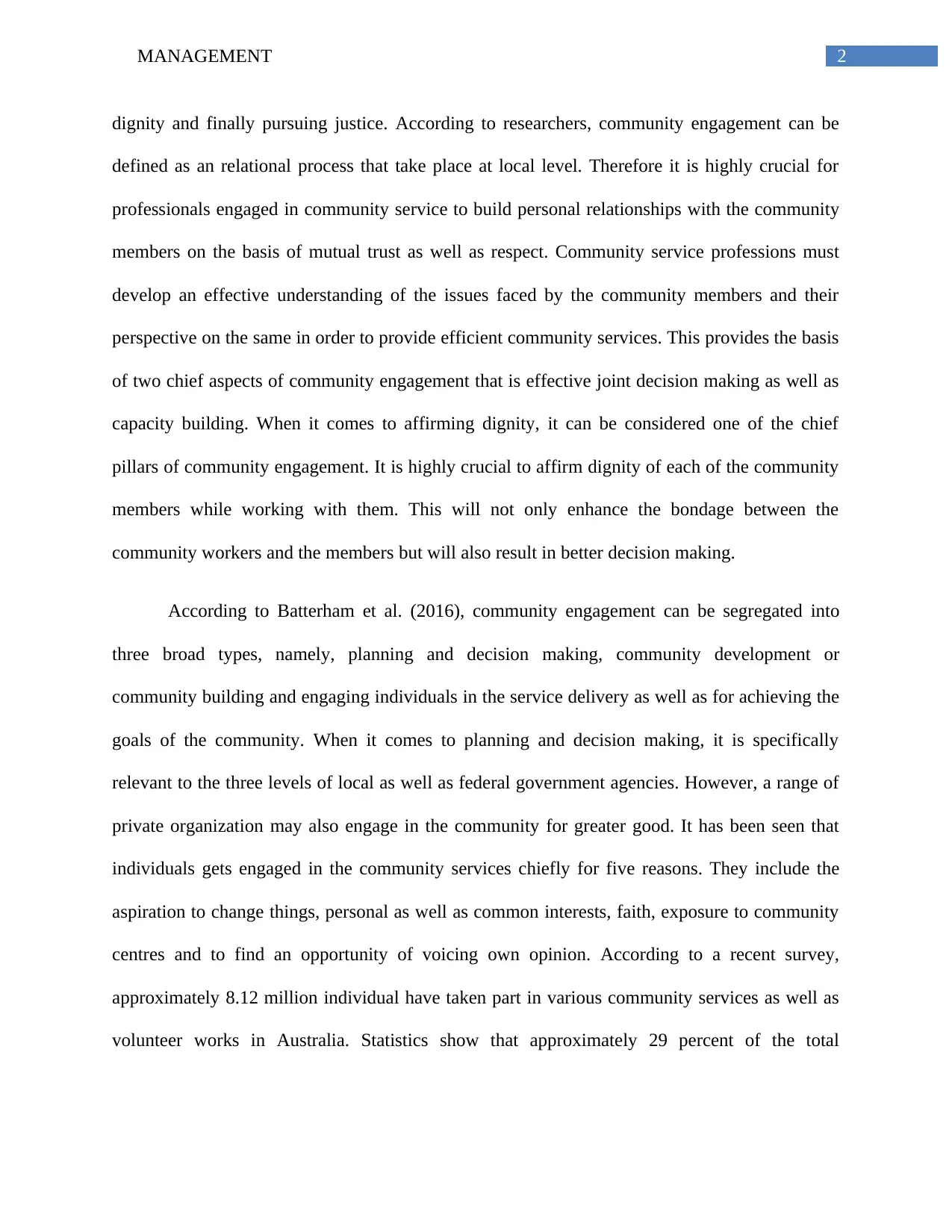
2MANAGEMENT
dignity and finally pursuing justice. According to researchers, community engagement can be
defined as an relational process that take place at local level. Therefore it is highly crucial for
professionals engaged in community service to build personal relationships with the community
members on the basis of mutual trust as well as respect. Community service professions must
develop an effective understanding of the issues faced by the community members and their
perspective on the same in order to provide efficient community services. This provides the basis
of two chief aspects of community engagement that is effective joint decision making as well as
capacity building. When it comes to affirming dignity, it can be considered one of the chief
pillars of community engagement. It is highly crucial to affirm dignity of each of the community
members while working with them. This will not only enhance the bondage between the
community workers and the members but will also result in better decision making.
According to Batterham et al. (2016), community engagement can be segregated into
three broad types, namely, planning and decision making, community development or
community building and engaging individuals in the service delivery as well as for achieving the
goals of the community. When it comes to planning and decision making, it is specifically
relevant to the three levels of local as well as federal government agencies. However, a range of
private organization may also engage in the community for greater good. It has been seen that
individuals gets engaged in the community services chiefly for five reasons. They include the
aspiration to change things, personal as well as common interests, faith, exposure to community
centres and to find an opportunity of voicing own opinion. According to a recent survey,
approximately 8.12 million individual have taken part in various community services as well as
volunteer works in Australia. Statistics show that approximately 29 percent of the total
dignity and finally pursuing justice. According to researchers, community engagement can be
defined as an relational process that take place at local level. Therefore it is highly crucial for
professionals engaged in community service to build personal relationships with the community
members on the basis of mutual trust as well as respect. Community service professions must
develop an effective understanding of the issues faced by the community members and their
perspective on the same in order to provide efficient community services. This provides the basis
of two chief aspects of community engagement that is effective joint decision making as well as
capacity building. When it comes to affirming dignity, it can be considered one of the chief
pillars of community engagement. It is highly crucial to affirm dignity of each of the community
members while working with them. This will not only enhance the bondage between the
community workers and the members but will also result in better decision making.
According to Batterham et al. (2016), community engagement can be segregated into
three broad types, namely, planning and decision making, community development or
community building and engaging individuals in the service delivery as well as for achieving the
goals of the community. When it comes to planning and decision making, it is specifically
relevant to the three levels of local as well as federal government agencies. However, a range of
private organization may also engage in the community for greater good. It has been seen that
individuals gets engaged in the community services chiefly for five reasons. They include the
aspiration to change things, personal as well as common interests, faith, exposure to community
centres and to find an opportunity of voicing own opinion. According to a recent survey,
approximately 8.12 million individual have taken part in various community services as well as
volunteer works in Australia. Statistics show that approximately 29 percent of the total
⊘ This is a preview!⊘
Do you want full access?
Subscribe today to unlock all pages.

Trusted by 1+ million students worldwide
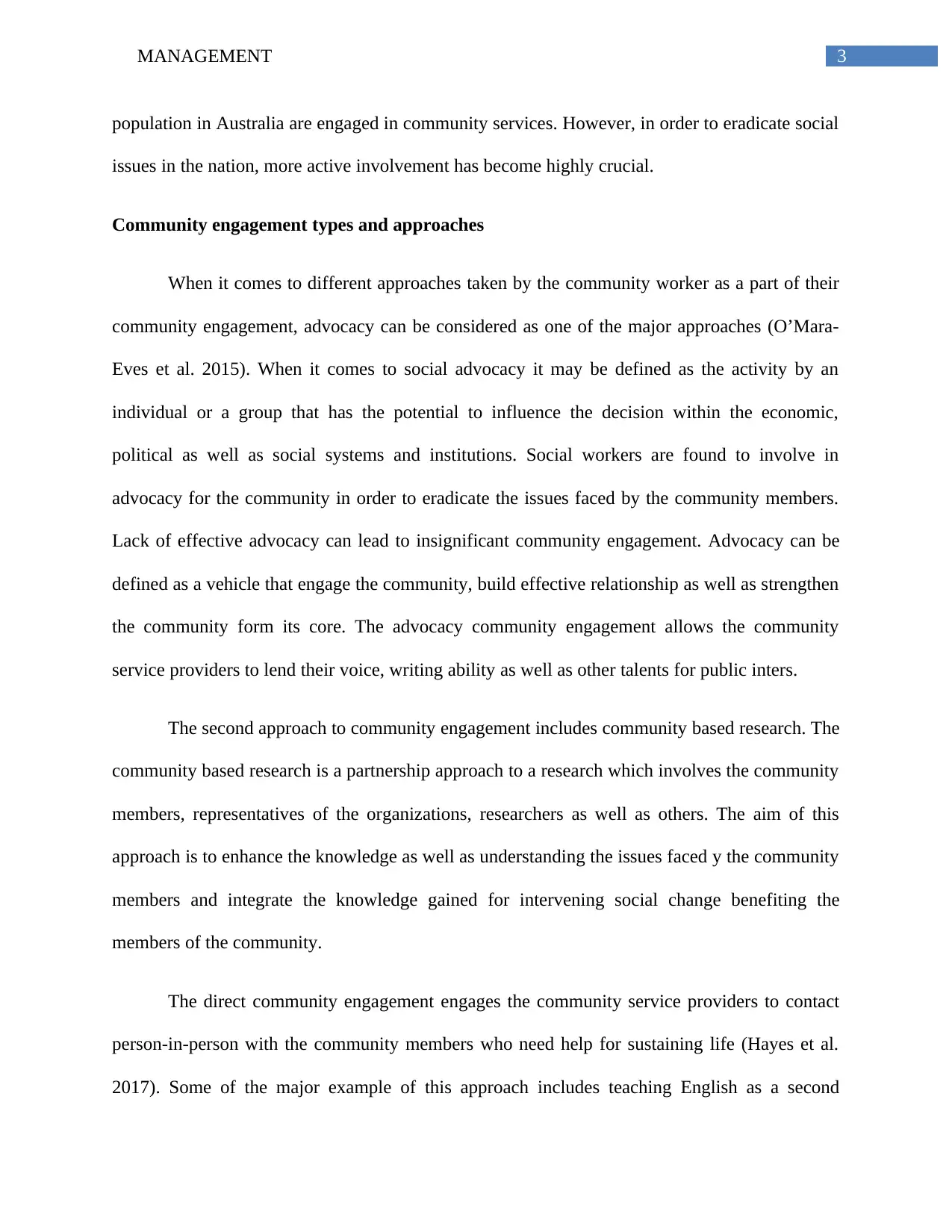
3MANAGEMENT
population in Australia are engaged in community services. However, in order to eradicate social
issues in the nation, more active involvement has become highly crucial.
Community engagement types and approaches
When it comes to different approaches taken by the community worker as a part of their
community engagement, advocacy can be considered as one of the major approaches (O’Mara-
Eves et al. 2015). When it comes to social advocacy it may be defined as the activity by an
individual or a group that has the potential to influence the decision within the economic,
political as well as social systems and institutions. Social workers are found to involve in
advocacy for the community in order to eradicate the issues faced by the community members.
Lack of effective advocacy can lead to insignificant community engagement. Advocacy can be
defined as a vehicle that engage the community, build effective relationship as well as strengthen
the community form its core. The advocacy community engagement allows the community
service providers to lend their voice, writing ability as well as other talents for public inters.
The second approach to community engagement includes community based research. The
community based research is a partnership approach to a research which involves the community
members, representatives of the organizations, researchers as well as others. The aim of this
approach is to enhance the knowledge as well as understanding the issues faced y the community
members and integrate the knowledge gained for intervening social change benefiting the
members of the community.
The direct community engagement engages the community service providers to contact
person-in-person with the community members who need help for sustaining life (Hayes et al.
2017). Some of the major example of this approach includes teaching English as a second
population in Australia are engaged in community services. However, in order to eradicate social
issues in the nation, more active involvement has become highly crucial.
Community engagement types and approaches
When it comes to different approaches taken by the community worker as a part of their
community engagement, advocacy can be considered as one of the major approaches (O’Mara-
Eves et al. 2015). When it comes to social advocacy it may be defined as the activity by an
individual or a group that has the potential to influence the decision within the economic,
political as well as social systems and institutions. Social workers are found to involve in
advocacy for the community in order to eradicate the issues faced by the community members.
Lack of effective advocacy can lead to insignificant community engagement. Advocacy can be
defined as a vehicle that engage the community, build effective relationship as well as strengthen
the community form its core. The advocacy community engagement allows the community
service providers to lend their voice, writing ability as well as other talents for public inters.
The second approach to community engagement includes community based research. The
community based research is a partnership approach to a research which involves the community
members, representatives of the organizations, researchers as well as others. The aim of this
approach is to enhance the knowledge as well as understanding the issues faced y the community
members and integrate the knowledge gained for intervening social change benefiting the
members of the community.
The direct community engagement engages the community service providers to contact
person-in-person with the community members who need help for sustaining life (Hayes et al.
2017). Some of the major example of this approach includes teaching English as a second
Paraphrase This Document
Need a fresh take? Get an instant paraphrase of this document with our AI Paraphraser
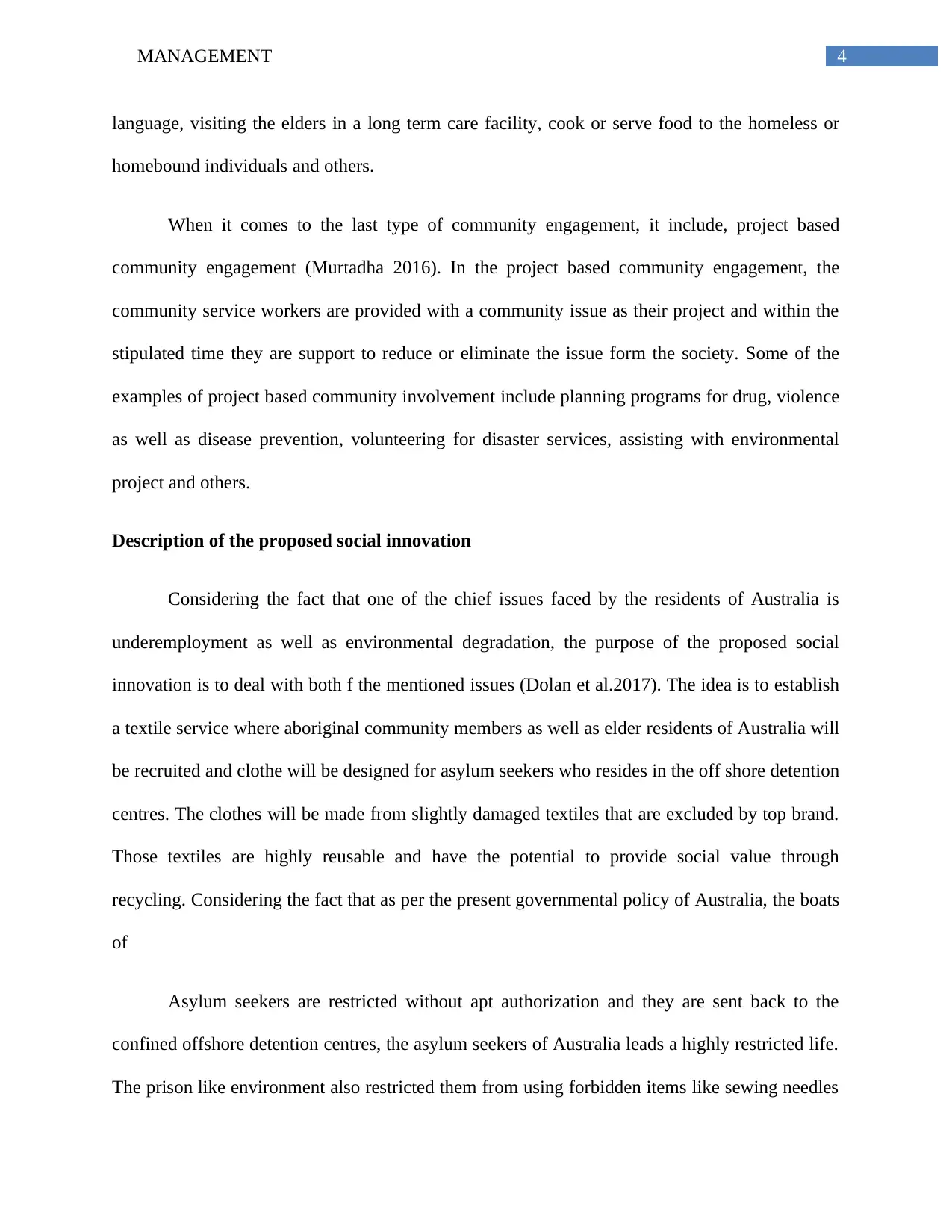
4MANAGEMENT
language, visiting the elders in a long term care facility, cook or serve food to the homeless or
homebound individuals and others.
When it comes to the last type of community engagement, it include, project based
community engagement (Murtadha 2016). In the project based community engagement, the
community service workers are provided with a community issue as their project and within the
stipulated time they are support to reduce or eliminate the issue form the society. Some of the
examples of project based community involvement include planning programs for drug, violence
as well as disease prevention, volunteering for disaster services, assisting with environmental
project and others.
Description of the proposed social innovation
Considering the fact that one of the chief issues faced by the residents of Australia is
underemployment as well as environmental degradation, the purpose of the proposed social
innovation is to deal with both f the mentioned issues (Dolan et al.2017). The idea is to establish
a textile service where aboriginal community members as well as elder residents of Australia will
be recruited and clothe will be designed for asylum seekers who resides in the off shore detention
centres. The clothes will be made from slightly damaged textiles that are excluded by top brand.
Those textiles are highly reusable and have the potential to provide social value through
recycling. Considering the fact that as per the present governmental policy of Australia, the boats
of
Asylum seekers are restricted without apt authorization and they are sent back to the
confined offshore detention centres, the asylum seekers of Australia leads a highly restricted life.
The prison like environment also restricted them from using forbidden items like sewing needles
language, visiting the elders in a long term care facility, cook or serve food to the homeless or
homebound individuals and others.
When it comes to the last type of community engagement, it include, project based
community engagement (Murtadha 2016). In the project based community engagement, the
community service workers are provided with a community issue as their project and within the
stipulated time they are support to reduce or eliminate the issue form the society. Some of the
examples of project based community involvement include planning programs for drug, violence
as well as disease prevention, volunteering for disaster services, assisting with environmental
project and others.
Description of the proposed social innovation
Considering the fact that one of the chief issues faced by the residents of Australia is
underemployment as well as environmental degradation, the purpose of the proposed social
innovation is to deal with both f the mentioned issues (Dolan et al.2017). The idea is to establish
a textile service where aboriginal community members as well as elder residents of Australia will
be recruited and clothe will be designed for asylum seekers who resides in the off shore detention
centres. The clothes will be made from slightly damaged textiles that are excluded by top brand.
Those textiles are highly reusable and have the potential to provide social value through
recycling. Considering the fact that as per the present governmental policy of Australia, the boats
of
Asylum seekers are restricted without apt authorization and they are sent back to the
confined offshore detention centres, the asylum seekers of Australia leads a highly restricted life.
The prison like environment also restricted them from using forbidden items like sewing needles
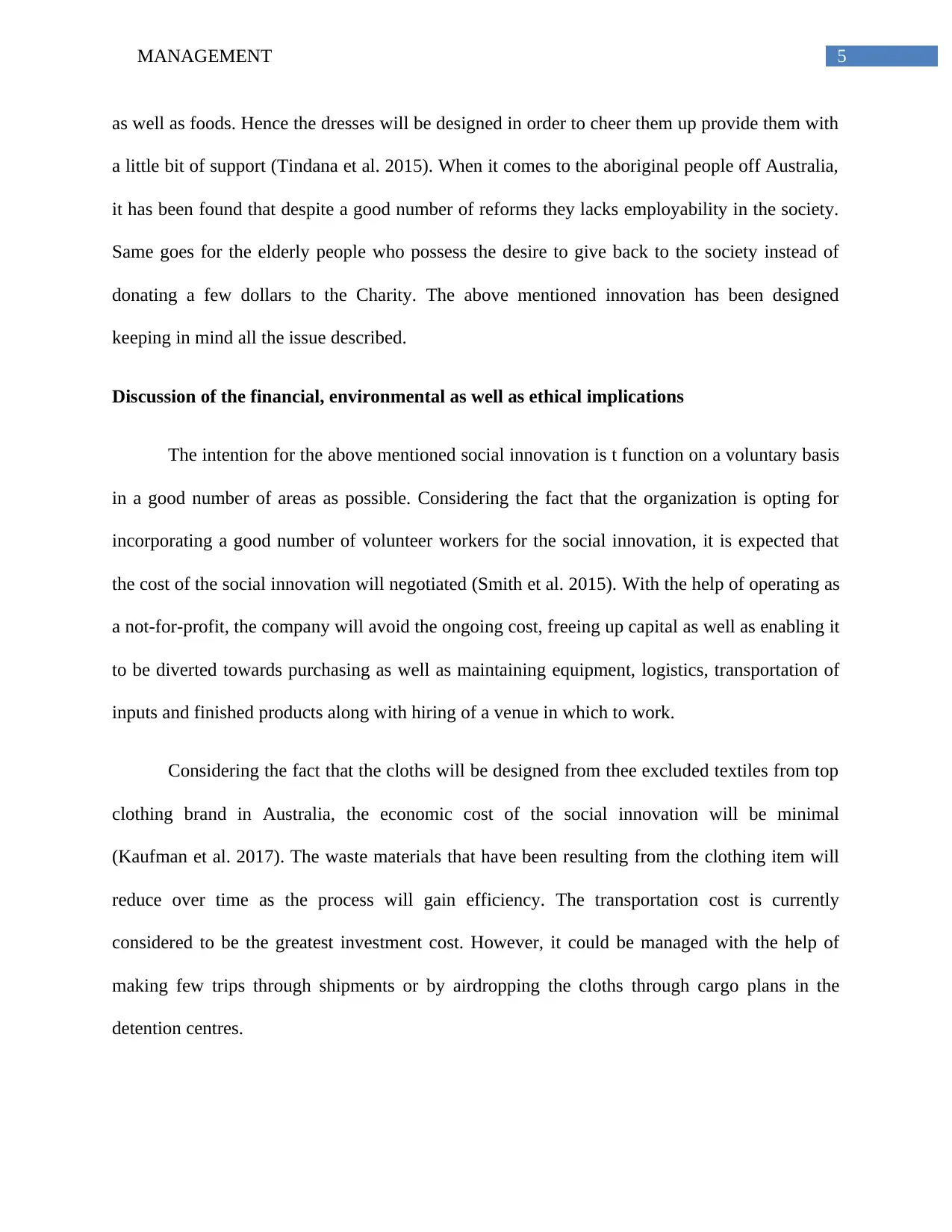
5MANAGEMENT
as well as foods. Hence the dresses will be designed in order to cheer them up provide them with
a little bit of support (Tindana et al. 2015). When it comes to the aboriginal people off Australia,
it has been found that despite a good number of reforms they lacks employability in the society.
Same goes for the elderly people who possess the desire to give back to the society instead of
donating a few dollars to the Charity. The above mentioned innovation has been designed
keeping in mind all the issue described.
Discussion of the financial, environmental as well as ethical implications
The intention for the above mentioned social innovation is t function on a voluntary basis
in a good number of areas as possible. Considering the fact that the organization is opting for
incorporating a good number of volunteer workers for the social innovation, it is expected that
the cost of the social innovation will negotiated (Smith et al. 2015). With the help of operating as
a not-for-profit, the company will avoid the ongoing cost, freeing up capital as well as enabling it
to be diverted towards purchasing as well as maintaining equipment, logistics, transportation of
inputs and finished products along with hiring of a venue in which to work.
Considering the fact that the cloths will be designed from thee excluded textiles from top
clothing brand in Australia, the economic cost of the social innovation will be minimal
(Kaufman et al. 2017). The waste materials that have been resulting from the clothing item will
reduce over time as the process will gain efficiency. The transportation cost is currently
considered to be the greatest investment cost. However, it could be managed with the help of
making few trips through shipments or by airdropping the cloths through cargo plans in the
detention centres.
as well as foods. Hence the dresses will be designed in order to cheer them up provide them with
a little bit of support (Tindana et al. 2015). When it comes to the aboriginal people off Australia,
it has been found that despite a good number of reforms they lacks employability in the society.
Same goes for the elderly people who possess the desire to give back to the society instead of
donating a few dollars to the Charity. The above mentioned innovation has been designed
keeping in mind all the issue described.
Discussion of the financial, environmental as well as ethical implications
The intention for the above mentioned social innovation is t function on a voluntary basis
in a good number of areas as possible. Considering the fact that the organization is opting for
incorporating a good number of volunteer workers for the social innovation, it is expected that
the cost of the social innovation will negotiated (Smith et al. 2015). With the help of operating as
a not-for-profit, the company will avoid the ongoing cost, freeing up capital as well as enabling it
to be diverted towards purchasing as well as maintaining equipment, logistics, transportation of
inputs and finished products along with hiring of a venue in which to work.
Considering the fact that the cloths will be designed from thee excluded textiles from top
clothing brand in Australia, the economic cost of the social innovation will be minimal
(Kaufman et al. 2017). The waste materials that have been resulting from the clothing item will
reduce over time as the process will gain efficiency. The transportation cost is currently
considered to be the greatest investment cost. However, it could be managed with the help of
making few trips through shipments or by airdropping the cloths through cargo plans in the
detention centres.
⊘ This is a preview!⊘
Do you want full access?
Subscribe today to unlock all pages.

Trusted by 1+ million students worldwide
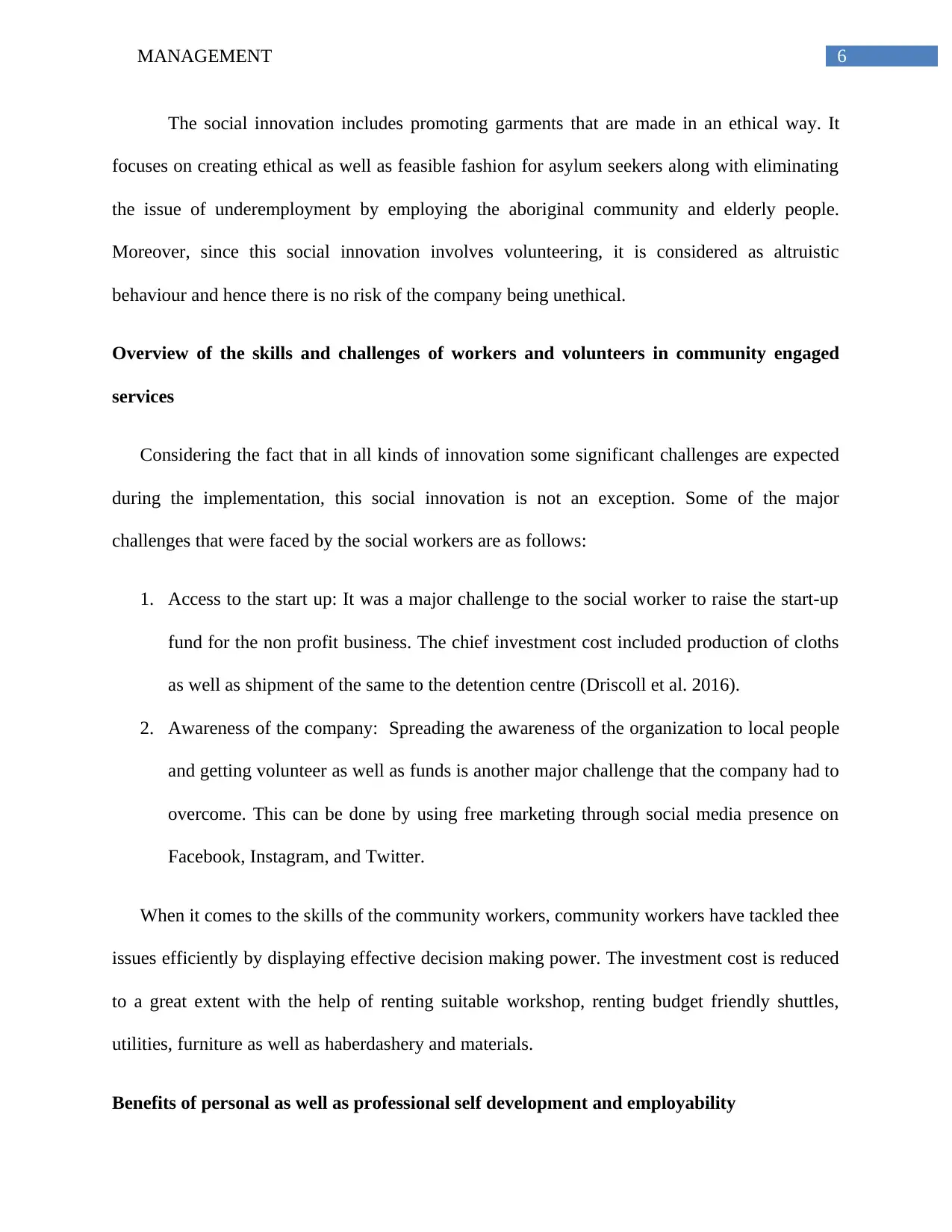
6MANAGEMENT
The social innovation includes promoting garments that are made in an ethical way. It
focuses on creating ethical as well as feasible fashion for asylum seekers along with eliminating
the issue of underemployment by employing the aboriginal community and elderly people.
Moreover, since this social innovation involves volunteering, it is considered as altruistic
behaviour and hence there is no risk of the company being unethical.
Overview of the skills and challenges of workers and volunteers in community engaged
services
Considering the fact that in all kinds of innovation some significant challenges are expected
during the implementation, this social innovation is not an exception. Some of the major
challenges that were faced by the social workers are as follows:
1. Access to the start up: It was a major challenge to the social worker to raise the start-up
fund for the non profit business. The chief investment cost included production of cloths
as well as shipment of the same to the detention centre (Driscoll et al. 2016).
2. Awareness of the company: Spreading the awareness of the organization to local people
and getting volunteer as well as funds is another major challenge that the company had to
overcome. This can be done by using free marketing through social media presence on
Facebook, Instagram, and Twitter.
When it comes to the skills of the community workers, community workers have tackled thee
issues efficiently by displaying effective decision making power. The investment cost is reduced
to a great extent with the help of renting suitable workshop, renting budget friendly shuttles,
utilities, furniture as well as haberdashery and materials.
Benefits of personal as well as professional self development and employability
The social innovation includes promoting garments that are made in an ethical way. It
focuses on creating ethical as well as feasible fashion for asylum seekers along with eliminating
the issue of underemployment by employing the aboriginal community and elderly people.
Moreover, since this social innovation involves volunteering, it is considered as altruistic
behaviour and hence there is no risk of the company being unethical.
Overview of the skills and challenges of workers and volunteers in community engaged
services
Considering the fact that in all kinds of innovation some significant challenges are expected
during the implementation, this social innovation is not an exception. Some of the major
challenges that were faced by the social workers are as follows:
1. Access to the start up: It was a major challenge to the social worker to raise the start-up
fund for the non profit business. The chief investment cost included production of cloths
as well as shipment of the same to the detention centre (Driscoll et al. 2016).
2. Awareness of the company: Spreading the awareness of the organization to local people
and getting volunteer as well as funds is another major challenge that the company had to
overcome. This can be done by using free marketing through social media presence on
Facebook, Instagram, and Twitter.
When it comes to the skills of the community workers, community workers have tackled thee
issues efficiently by displaying effective decision making power. The investment cost is reduced
to a great extent with the help of renting suitable workshop, renting budget friendly shuttles,
utilities, furniture as well as haberdashery and materials.
Benefits of personal as well as professional self development and employability
Paraphrase This Document
Need a fresh take? Get an instant paraphrase of this document with our AI Paraphraser
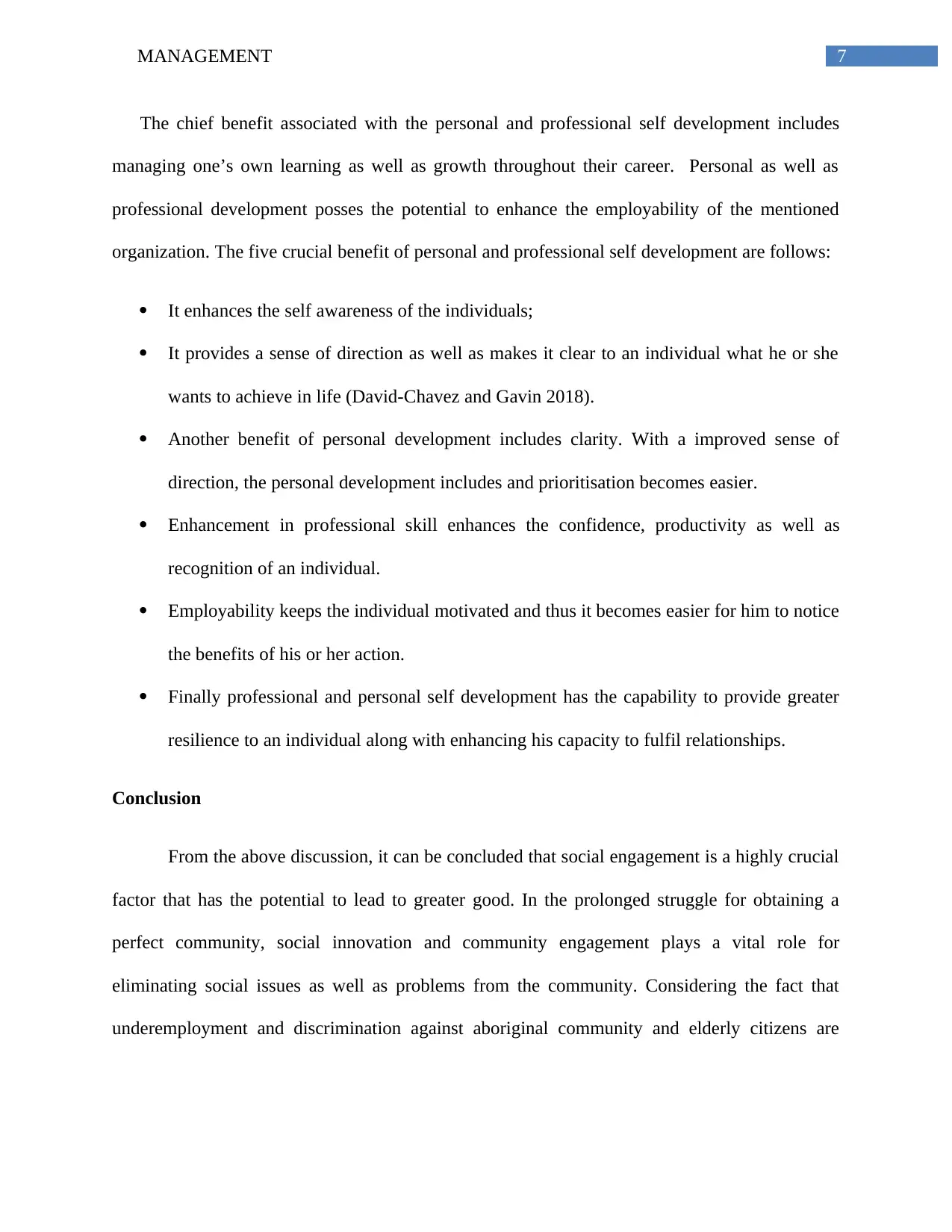
7MANAGEMENT
The chief benefit associated with the personal and professional self development includes
managing one’s own learning as well as growth throughout their career. Personal as well as
professional development posses the potential to enhance the employability of the mentioned
organization. The five crucial benefit of personal and professional self development are follows:
It enhances the self awareness of the individuals;
It provides a sense of direction as well as makes it clear to an individual what he or she
wants to achieve in life (David-Chavez and Gavin 2018).
Another benefit of personal development includes clarity. With a improved sense of
direction, the personal development includes and prioritisation becomes easier.
Enhancement in professional skill enhances the confidence, productivity as well as
recognition of an individual.
Employability keeps the individual motivated and thus it becomes easier for him to notice
the benefits of his or her action.
Finally professional and personal self development has the capability to provide greater
resilience to an individual along with enhancing his capacity to fulfil relationships.
Conclusion
From the above discussion, it can be concluded that social engagement is a highly crucial
factor that has the potential to lead to greater good. In the prolonged struggle for obtaining a
perfect community, social innovation and community engagement plays a vital role for
eliminating social issues as well as problems from the community. Considering the fact that
underemployment and discrimination against aboriginal community and elderly citizens are
The chief benefit associated with the personal and professional self development includes
managing one’s own learning as well as growth throughout their career. Personal as well as
professional development posses the potential to enhance the employability of the mentioned
organization. The five crucial benefit of personal and professional self development are follows:
It enhances the self awareness of the individuals;
It provides a sense of direction as well as makes it clear to an individual what he or she
wants to achieve in life (David-Chavez and Gavin 2018).
Another benefit of personal development includes clarity. With a improved sense of
direction, the personal development includes and prioritisation becomes easier.
Enhancement in professional skill enhances the confidence, productivity as well as
recognition of an individual.
Employability keeps the individual motivated and thus it becomes easier for him to notice
the benefits of his or her action.
Finally professional and personal self development has the capability to provide greater
resilience to an individual along with enhancing his capacity to fulfil relationships.
Conclusion
From the above discussion, it can be concluded that social engagement is a highly crucial
factor that has the potential to lead to greater good. In the prolonged struggle for obtaining a
perfect community, social innovation and community engagement plays a vital role for
eliminating social issues as well as problems from the community. Considering the fact that
underemployment and discrimination against aboriginal community and elderly citizens are

8MANAGEMENT
some major concern of the Australian society, implementing the above discussed social
innovation can reduce the issues to a significant level.
some major concern of the Australian society, implementing the above discussed social
innovation can reduce the issues to a significant level.
⊘ This is a preview!⊘
Do you want full access?
Subscribe today to unlock all pages.

Trusted by 1+ million students worldwide
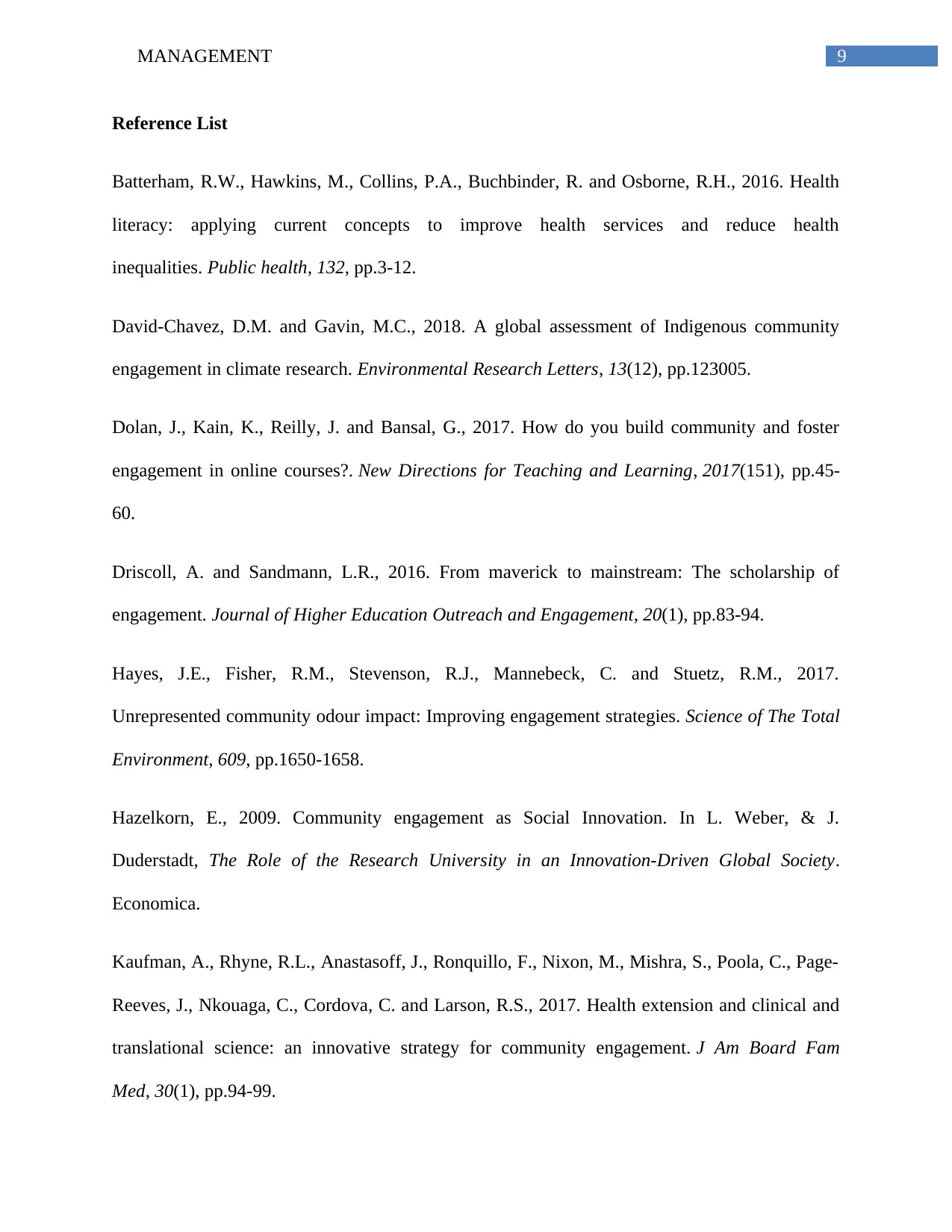
9MANAGEMENT
Reference List
Batterham, R.W., Hawkins, M., Collins, P.A., Buchbinder, R. and Osborne, R.H., 2016. Health
literacy: applying current concepts to improve health services and reduce health
inequalities. Public health, 132, pp.3-12.
David-Chavez, D.M. and Gavin, M.C., 2018. A global assessment of Indigenous community
engagement in climate research. Environmental Research Letters, 13(12), pp.123005.
Dolan, J., Kain, K., Reilly, J. and Bansal, G., 2017. How do you build community and foster
engagement in online courses?. New Directions for Teaching and Learning, 2017(151), pp.45-
60.
Driscoll, A. and Sandmann, L.R., 2016. From maverick to mainstream: The scholarship of
engagement. Journal of Higher Education Outreach and Engagement, 20(1), pp.83-94.
Hayes, J.E., Fisher, R.M., Stevenson, R.J., Mannebeck, C. and Stuetz, R.M., 2017.
Unrepresented community odour impact: Improving engagement strategies. Science of The Total
Environment, 609, pp.1650-1658.
Hazelkorn, E., 2009. Community engagement as Social Innovation. In L. Weber, & J.
Duderstadt, The Role of the Research University in an Innovation-Driven Global Society.
Economica.
Kaufman, A., Rhyne, R.L., Anastasoff, J., Ronquillo, F., Nixon, M., Mishra, S., Poola, C., Page-
Reeves, J., Nkouaga, C., Cordova, C. and Larson, R.S., 2017. Health extension and clinical and
translational science: an innovative strategy for community engagement. J Am Board Fam
Med, 30(1), pp.94-99.
Reference List
Batterham, R.W., Hawkins, M., Collins, P.A., Buchbinder, R. and Osborne, R.H., 2016. Health
literacy: applying current concepts to improve health services and reduce health
inequalities. Public health, 132, pp.3-12.
David-Chavez, D.M. and Gavin, M.C., 2018. A global assessment of Indigenous community
engagement in climate research. Environmental Research Letters, 13(12), pp.123005.
Dolan, J., Kain, K., Reilly, J. and Bansal, G., 2017. How do you build community and foster
engagement in online courses?. New Directions for Teaching and Learning, 2017(151), pp.45-
60.
Driscoll, A. and Sandmann, L.R., 2016. From maverick to mainstream: The scholarship of
engagement. Journal of Higher Education Outreach and Engagement, 20(1), pp.83-94.
Hayes, J.E., Fisher, R.M., Stevenson, R.J., Mannebeck, C. and Stuetz, R.M., 2017.
Unrepresented community odour impact: Improving engagement strategies. Science of The Total
Environment, 609, pp.1650-1658.
Hazelkorn, E., 2009. Community engagement as Social Innovation. In L. Weber, & J.
Duderstadt, The Role of the Research University in an Innovation-Driven Global Society.
Economica.
Kaufman, A., Rhyne, R.L., Anastasoff, J., Ronquillo, F., Nixon, M., Mishra, S., Poola, C., Page-
Reeves, J., Nkouaga, C., Cordova, C. and Larson, R.S., 2017. Health extension and clinical and
translational science: an innovative strategy for community engagement. J Am Board Fam
Med, 30(1), pp.94-99.
Paraphrase This Document
Need a fresh take? Get an instant paraphrase of this document with our AI Paraphraser
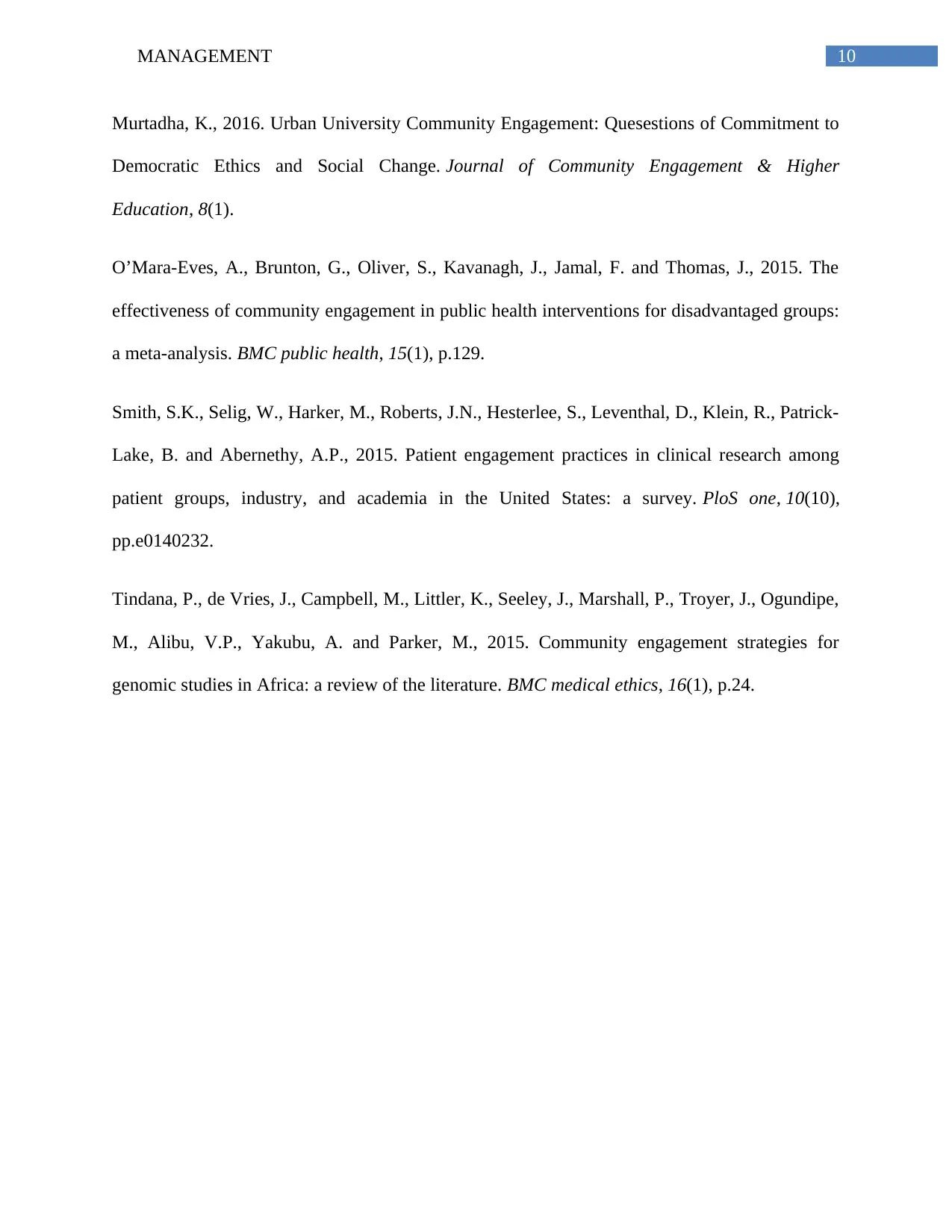
10MANAGEMENT
Murtadha, K., 2016. Urban University Community Engagement: Quesestions of Commitment to
Democratic Ethics and Social Change. Journal of Community Engagement & Higher
Education, 8(1).
O’Mara-Eves, A., Brunton, G., Oliver, S., Kavanagh, J., Jamal, F. and Thomas, J., 2015. The
effectiveness of community engagement in public health interventions for disadvantaged groups:
a meta-analysis. BMC public health, 15(1), p.129.
Smith, S.K., Selig, W., Harker, M., Roberts, J.N., Hesterlee, S., Leventhal, D., Klein, R., Patrick-
Lake, B. and Abernethy, A.P., 2015. Patient engagement practices in clinical research among
patient groups, industry, and academia in the United States: a survey. PloS one, 10(10),
pp.e0140232.
Tindana, P., de Vries, J., Campbell, M., Littler, K., Seeley, J., Marshall, P., Troyer, J., Ogundipe,
M., Alibu, V.P., Yakubu, A. and Parker, M., 2015. Community engagement strategies for
genomic studies in Africa: a review of the literature. BMC medical ethics, 16(1), p.24.
Murtadha, K., 2016. Urban University Community Engagement: Quesestions of Commitment to
Democratic Ethics and Social Change. Journal of Community Engagement & Higher
Education, 8(1).
O’Mara-Eves, A., Brunton, G., Oliver, S., Kavanagh, J., Jamal, F. and Thomas, J., 2015. The
effectiveness of community engagement in public health interventions for disadvantaged groups:
a meta-analysis. BMC public health, 15(1), p.129.
Smith, S.K., Selig, W., Harker, M., Roberts, J.N., Hesterlee, S., Leventhal, D., Klein, R., Patrick-
Lake, B. and Abernethy, A.P., 2015. Patient engagement practices in clinical research among
patient groups, industry, and academia in the United States: a survey. PloS one, 10(10),
pp.e0140232.
Tindana, P., de Vries, J., Campbell, M., Littler, K., Seeley, J., Marshall, P., Troyer, J., Ogundipe,
M., Alibu, V.P., Yakubu, A. and Parker, M., 2015. Community engagement strategies for
genomic studies in Africa: a review of the literature. BMC medical ethics, 16(1), p.24.
1 out of 11
Related Documents
Your All-in-One AI-Powered Toolkit for Academic Success.
+13062052269
info@desklib.com
Available 24*7 on WhatsApp / Email
![[object Object]](/_next/static/media/star-bottom.7253800d.svg)
Unlock your academic potential
Copyright © 2020–2026 A2Z Services. All Rights Reserved. Developed and managed by ZUCOL.





